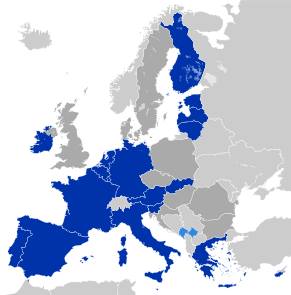Kamil Augustyniak
Since 1st January 2015 Lithuania is considered as the nineteenth member of Eurozone in the European Union and can finally fully enjoy its position in the European Central Bank.

Source: http://emergingequity.org/
Lithuania on the way towards euro adoption
From 1922 to 1940 and then, continuously, from 1993, Lithuania had its own currency – Lithuanian litas (LTL). The change of currency was planned from more than decade when the agreement between Lithuania and the European Central Bank was concluded. Pursuant to the new document, signed in 2002, the litas was pegged to the euro at the rate of 3.4528 to 1.
Although Lithuania still couldn’t be an active participant in meetings related to ECB monetary policy, the benefits of such enlargement were economically and politically based First of all, it has allowed the economy to be more predictable and balanced. Secondly, this was the first step toward adopting euro.
The first attempt at establishing euro in this country came in 2007 but it was less than successful. The European Commission did not give a green light to Lithuania to adopt the euro currency because of a high inflation and economic crisis. All these factors delayed the change which a lot of Lithuanian citizens support[1]. Fortunately, the delay suited Lithuania because it didn’t have to financially support weaker countries when the crisis came to the Eurozone, considering her unbalanced internal economic situation. Now, when Lithuania finally meets all legal and economic requirements (e.g. price stability, sound and sustainable public finances, exchange rate stability), it can officially benefit from EU’s common currency.
Opportunity to thrive
The most important advantage of adopting euro in Lithuania is coming nearer to the European Union. For any European country, being a member of the EU is significant, but being a member of the EU and Eurozone at once opens great possibilities and give stronger position on the international arena. Attractiveness of the region increases – new investors will not come across any obstacles of currency exchange. What is more, market competitiveness grows in comparison to other Baltic countries which have already adopted euro. This factor means a lot for Lithuania which, very often, occurs with Estonia and Latvia that are in Eurozone from 2011 and 2014 respectively. The risk of omission of Lithuania is now quite small. Change of currency is only a new beginning for reforms which will have the desired result in investments and more integrated trade with the EU. For a new member of Eurozone this can be considered as a crucial point in near development due to a new Russian policy which imposed embargo on foodstuff from the EU. In result, the forecast of economic growth of Lithuania for 2015 has dropped from 4.3 to 3.3%.
What about prices?
The Lithuanian government assures its citizens that they will not feel the appreciation of prices thanks to a special agreements between state administration and entrepreneurs all around the country. Those who will try to seize an opportunity of such a big change will be punished.
[1] http://ec.europa.eu/public_opinion/flash/fl_400_sum_en.pdf


